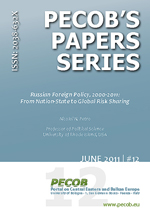and Balkan Europe
by IECOB & AIS Università di Bologna

This area collects and offers a wide range of scientific contributions and provides scholars, researchers and specialists with publishing opportunities for their research results
Russian Foreign policy, 2000-2011: From Nation-State to Global Risk Sharing
June 2011 | #12
by: Nicolai N. Petro
Professor of Political Science
University of Rhode Island, USA
pp: 42
ISSN: 2038-632X

- June 2011 | #12
Abstract
Russian foreign policy thinking has evolved significantly in recent years. Defined throughout the 1990s by a notable lack of any clearly defined strategic course, there is now a clear vision of the type of global order that Russia wants. Russian foreign policy thinking is reaching far beyond traditional realism to embrace global risk sharing, although the extent to which the country ought to embrace a truly global security agenda is still hotly debated. Too little attention has been paid in the West to this intellectual evolution, and to what it says about Russia's long term foreign policy goals.
Keywords
CIS, Dmitry Medvedev, Energy policy, Global risk sharing, Russian foreign policy, Russian national security policy, Sovereign democracy, Vladimir Putin
Table of contents
Abstract
Keywords
1 Introduction
2 Phase One: Re-establishing Russian sovereignty
2.1 Putin's Speech in Munich
3 Phase Two: Russia, Forward!
3.1 The Georgian Setback of 2008
3.2 Operation "Reset"
3.3 Russian Foreign Policy Through the Energy Looking Glass
4 Phase Three: Beyond Reset—Pax Medvedica?
5 Conclusion
Recommended Reading
Bibliography
Download the paper
Version
Ver.: 01
Time stamp: 20110624104633


 Download the full paper!
Download the full paper!





